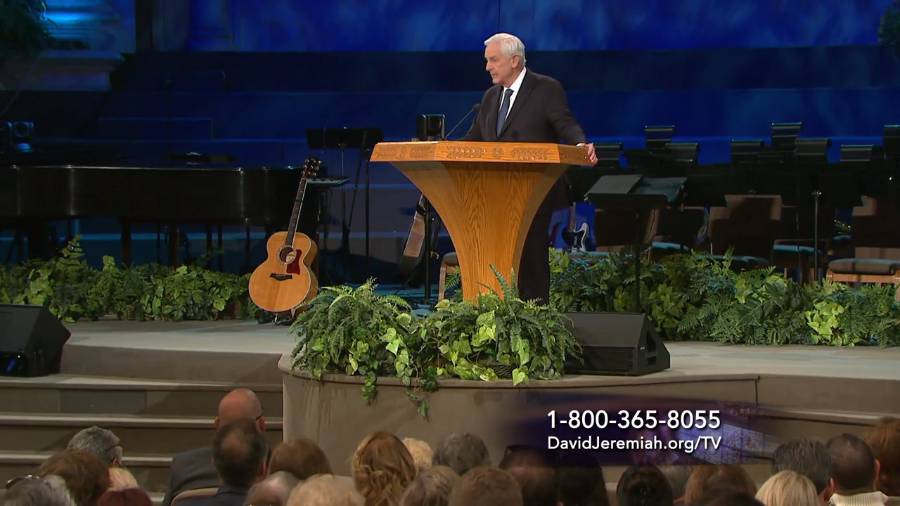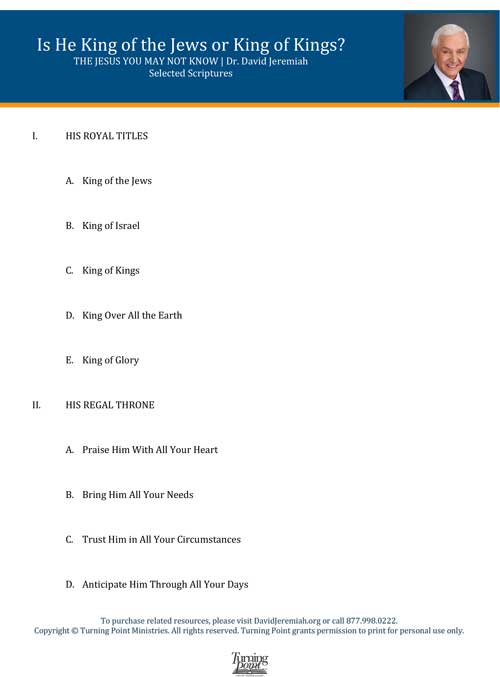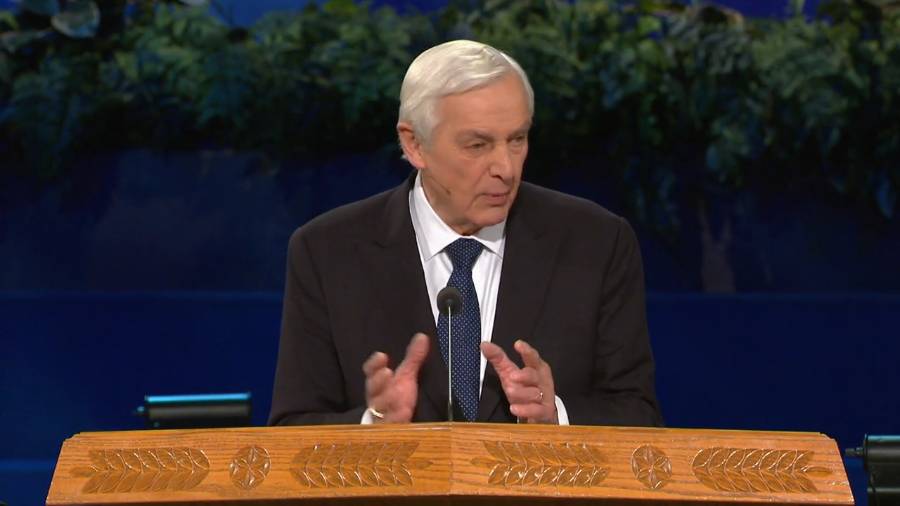The Jesus You May Not Know
Learn toFathomJesus like never before
Resources from David Jeremiah to aid in your journey from knowing about Jesus to knowing Jesus.
Is He King of the Jews or King of Kings?
Thanks for downloading your free resource!
Thanks for downloading your free resource!

That the World May Know
By David Jeremiah
It is often said that to avoid disappointments we must avoid expectations. That is, if we have no expectations, we will not be disappointed with whatever happens in life. “Well, that was underwhelming! No problem—I had no expectations at all.”
I could say a lot about that philosophy of life. But my larger point for this article is to talk about our expectations of God. If someone asked us to describe what God would be like if He came to earth, we would have certain expectations. We would have standards, if you will, that anyone claiming to be God must meet.
First on our list of expectations might be that the person claimed to be God. After all, if a person didn’t believe himself to be God, why should we? Among the founders the major religions in the world, only one Person met that expectation: Jesus Christ.
The late pastor and theologian Thomas Schultz wrote in his doctoral dissertation, “Not one recognized religious leader, not Moses, Paul, Buddha, Mohammed, Confucius, etc., has ever claimed to be God; that is, with the exception of Jesus Christ. Christ is the only religious leader who has ever claimed to be deity and the only individual ever who has convinced a great portion of the world that He is God.”1
But just because someone claims to be God doesn’t prove that he is. At least it lets us know that he believes himself to be God. And if we want to identify which founder of a major world religion at least claimed to be deity, there is only One.
In his classic book, Mere Christianity, C. S. Lewis explored further the idea of Christ claiming to be God and reached an important conclusion. If Jesus claimed to be God, but actually wasn’t, then He was either mentally deluded or an intentional deceiver. That is, He was either a lunatic or a liar. In either case, lunatic or liar, we cannot hold Him up as a great moral teacher and leader. Lewis concluded, “Either this man was, and is, the Son of God: or else a madman or something worse…. But let us not come with any patronising nonsense about His being a great human teacher. He has not left that open to us.”2
Many religious leaders and prophets have been moral and ethical teachers, revered by their followers. But none of them claimed to be God.
Jesus was either a lunatic, liar, or Lord—the only religious figure in world history to have made the claim of deity and backed it up by His life, His teachings, His works, and His resurrection from the dead.
What does Jesus’ claim to deity mean to us?
Again, something totally different from any other religion: It means Christ, by virtue of His resurrection, can dwell in us and demonstrate the life of God to the world. Just as Jesus demonstrated His divinity to those around Him when He was on earth, we have the same opportunity nearly two thousand years later. We don’t become God, as some religions teach. Rather, the one true God comes to dwell in us.
The apostle Paul wrote in Galatians 2:20, “I have been crucified with Christ; it is no longer I who live, but Christ lives in me; and the life which I now live in the flesh I live by faith in the Son of God, who loved me and gave Himself for me.” None of the founders of other world religions claimed that they would come and live in their followers and allow them to have the same world–changing effect that the founder did. When those founders died, they were buried and remain buried to this day. But the crucified and resurrected Christ, through the Person of the Holy Spirit, comes to dwell in the life of everyone who accepts Him as Savior.
He told His disciples that they would receive power through the Holy Spirit (Acts 1:8) in order to continue His work in the world (Matthew 28:19–20). We do not do this work in our own power and strength, but in His. It is Jesus working in and through us (Mark 16:20) that makes Him unique in all the world—and that sets Christians apart from all other religious followers.
How Jesus Touched the World
It shows up in commercials and advertisements from time to time—the question, “What has your banker/real estate agent/mechanic/investment advisor done for you lately?” It’s a fair question and one that could be asked of anyone claiming to provide a pathway to God. In Jesus’ case, the question is easy to answer. I’ll list just four things Jesus has done for humanity which set Him apart from all other religious leaders.
1. He revealed God to man. Prior to Jesus’ revelation of Himself to the world, “no one [had] seen God at any time” (John 1:18). Jesus confirmed that fact but added a caveat: No one has seen God “except He who is from God; He has seen the Father” (John 6:46), referring, of course, to Himself. To His disciples, He made it even more clear: “He who has seen Me has seen the Father” (John 14:9). The writer of Hebrews says that God, having spoken previously in many ways to humanity, “has in these last days spoken to us by His Son” who is “the express image of [God’s] person” (Hebrews 1:2–3). Jesus Christ came to earth, in part, to reveal God to man—something no one else has ever done.
2. He reconciled man to God. The New Testament, in support of Jesus’ ministry and mission, acknowledges the chasm that sin created between man and God. So much so that we were “enemies” of God. But “we were reconciled to God through the death of His Son” (Romans 5:10). Put another way, God “has reconciled us to Himself through Jesus Christ” (2 Corinthians 5:18). That means the chasm has been bridged and we may once again enter into the presence of God. What we could not do in our weakness, Jesus Christ has done for us: kept the Law and paid the price for our lawbreaking—something no one else has ever done.
3. He restored broken lives. Jesus experienced every kind of pain and suffering that we have ever experienced. He suffered physically beyond imagination; He suffered spiritually over the lostness of people; He suffered emotionally over the betrayal of good friends; He suffered mentally over being temporarily forsaken by His Father. So if you have ever suffered physically, spiritually, emotionally, or mentally, you have a friend in Jesus. Because He never succumbed to the temptations His sufferings presented, He can help us as a living Friend and Savior (Hebrews 2:18; 4:15). He can restore our broken life—something no one else can do.
4. He renewed hope. Every human being hopes for “something better.” It comes from living in a fallen world. But where does that hope spring from? From the fact that God has put eternity in the heart of every person (Ecclesiastes 3:11). In the beginning, man was made to live eternally in God’s presence. But since sin and death entered, we have had to live with hope rather than the reality of eternity. Until Jesus, that is. He has promised eternal life (John 3:16) which begins the moment we come to know Him (John 17:3) and will be consummated when we are resurrected from the dead.
Hope, given by Jesus, is the anchor of our souls—something no one else has given (Hebrews 6:19).
How Jesus Can Touch the World Through Us
Jesus is unique in so many ways! But that uniqueness did not end when He ascended to heaven. The same Jesus who revealed God, reconciled man, restored broken lives, and renewed hope wants to do the same thing today through us. How is that possible? Because He lives in us by the power of the Holy Spirit.
Right now, Jesus is continuing to draw people to Himself and into His kingdom just as He did when He was on earth. But you and I—His followers—are the key link between then and now. First, we must know the Savior we serve (the four ministries I outlined above), and then we must allow Him to manifest those same ministries through us to a needy world. We must do it so that the world may know.
1Thomas Schultz, unpublished doctoral dissertation, Dallas Theological Seminary, 1962.
2C. S. Lewis, Mere Christianity (New York, NY: HarperOne, 1952), 52–53.
This article is an excerpt from the May 2020 issue of Turning Points Devotional Magazine, a ministry of Turning Point with Dr. David Jeremiah. Request your complimentary subscription today!





















